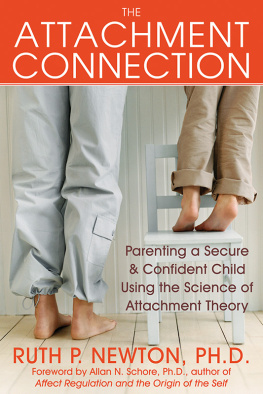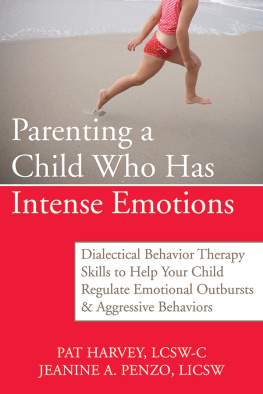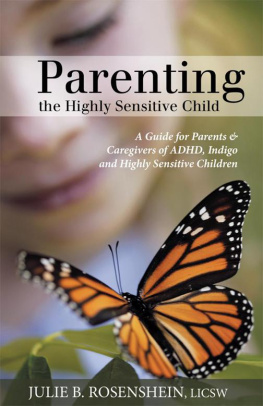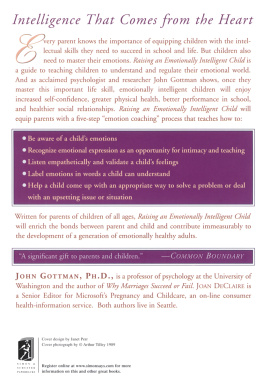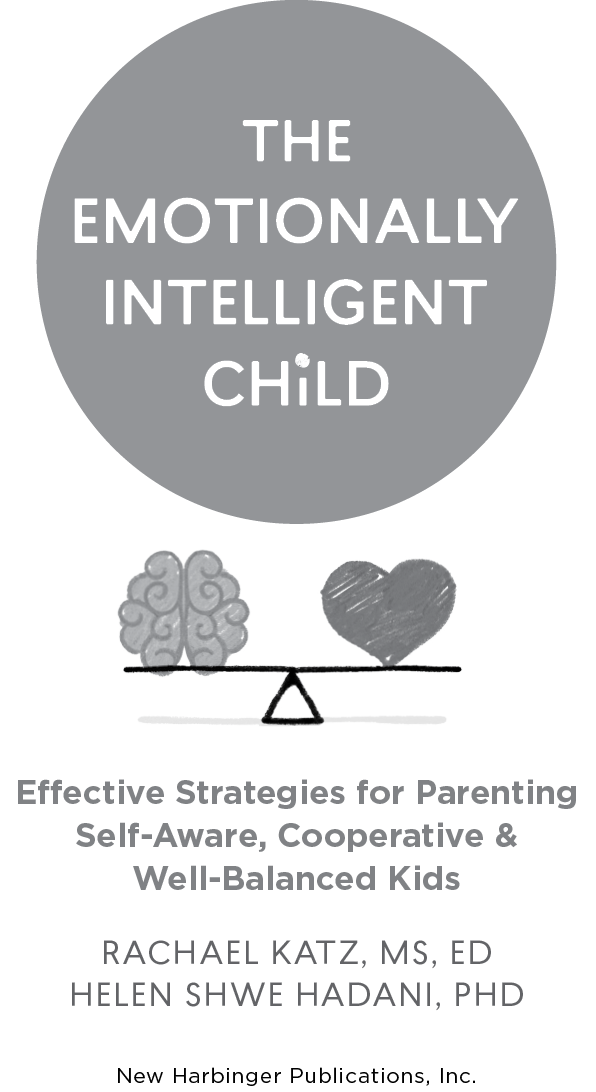For parents, watching their young ones navigate the world is an entrancing, if often bewildering experience. What is going on in those little heads? Why do they act the way they do? How can I help them grow to their full potential? In The Emotionally Intelligent Child , authors Katz and Hadani reveal the inner workings of the childs developing mind and offer parents useful techniques to help their children become more caring, thoughtful, and emotionally balanced.
Neil Izenberg, MD , founding editor in chief of Nemours www.kidshealth.org, professor emeritus of pediatrics at Sidney Kimmel Medical College, and advisor to organizations dedicated to childrens health
Rachael Katz and Helen Hadanis marvelous new book, The Emotionally Intelligent Child , will bring instant clarity and calm to parents who are struggling to help their children navigate social dynamics and turbulent feelings. Readers will feel that two knowledgeable and skillful experts are holding their hands and walking them through just the kinds of crises and dilemmas all parents face.
Susan Engel , senior lecturer in psychology, and director of the program in teaching at Williams College
As early childhood educators and parents, Helen and Rachael have a deep understanding and respect for the internal workings of childrens minds and childrens emotional development. They bring a smart, practical, and unique perspective to understanding and nurturing childrens social and emotional growth. This book is a must-read for parents who want to give their children the internal tools for success in school and beyond.
Karyn Flynn, MBA , former CEO of the Bay Area Discovery Museum; and founder of Holos, a weekly newsletter
There is nice- to-know information, and then there is need-to-know information. The Emotionally Intelligent Child is a must-read book for parents and caregivers looking for need-to-know information and strategies as a guide to raise socially and emotionally intelligent children.
Solwazi Samuel Johnson , mindfulness teacher, and mentor
You had me from the very beginning! Raising an emotionally intelligent child involves seeing your childs actions through the lens of their development and pausing to respond to their needs intentionally versus impulsively. Through a depth of wisdom, insight, and practical examples, the authors show how this universal truth can be accessible to all of us. I only wish that Id had this book when I was raising my children.
Gail Silver, JD, RCYT, E-RYT , award-winning author of Anhs Anger and other books for children, and founder of The School Mindfulness Project Inc. and Yoga Child Inc.
Practical, heartfelt, and clear, this book is an indispensable guide to parenting with wisdom and sensitivity. In this delightful book, Rachael and Helen weave together personal stories, accessible science, and down-to-earth tips for how to understand, connect with, and support your childs development. What a gift to our world!
Oren Jay Sofer , author of Say What You Mean
Feel what a child feels, see what they see, and your day-to-day interactions might just be happier. The Emotionally Intelligent Child is a refreshing, well-written, evidence-based book that adds much to the world of mindful parenting. If you are interested in reducing stress and rekindling the oft-elusive magic of being a mom or dad, this book is for you!
Kathy Hirsh-Pasek, PhD , professor of psychology at Temple University, senior fellow at the Brookings Institution, and coauthor of Becoming Brilliant and Einstein Never Used Flashcards
This book slowed me down and made me notice how Im engaging my own kids and others, too. As parents and educators, we think continuously about the things were doing, saying, and playing around our kidsor, more honestly, the things were not doing, saying, or playing. Rachael and Helen offer reassurance, explain plainly how kids view and experience their world, and offer helpful ideas for any grown-up to parent with more confidence and caring.
Gregg Behr , coauthor of When You Wonder, Youre Learning
Publishers Note
This publication is designed to provide accurate and authoritative information in regard to the subject matter covered. It is sold with the understanding that the publisher is not engaged in rendering psychological, financial, legal, or other professional services. If expert assistance or counseling is needed, the services of a competent professional should be sought.
NEW HARBINGER PUBLICATIONS is a registered trademark of New Harbinger Publications, Inc.
New Harbinger Publications is an employee-owned company.
Distributed in Canada by Raincoast Books
Copyright 2022 by Rachael Katz and Helen Shwe Hadani
New Harbinger Publications, Inc.
5674 Shattuck Avenue
Oakland, CA 94609
www.newharbinger.com
Cover design by Sara Christian
Acquired by Ryan Buresh
Edited by Cindy Nixon
All Rights Reserved
Library of Congress Cataloging-in-Publication Data
Names: Katz, Rachael, author. | Hadani, Helen Shwe, author.
Title: The emotionally intelligent child : effective strategies for parenting self-aware, cooperative, and well-balanced kids / Rachael Katz and Helen Shwe Hadani.
Description: Oakland, CA : New Harbinger Publications, [2022]
Identifiers: LCCN 2021059016 | ISBN 9781684038152 (trade paperback)
Subjects: LCSH: Emotions in children. | Emotional intelligence. | Parenting. | Child rearing.
Classification: LCC BF723.E6 K37 2022 | DDC 155.4/124--dc23/eng/20211208
LC record available at https://lccn.loc.gov/2021059016
Contents
An Introduction to Your Childs Mind
Angelas mom, Rene, wiped her eyes and blew her nose. I just want Angela to be happy. She feels sad at preschool and says other girls wont play with her. When I tell her to find someone else to play with, she snaps at me and says Im dumb. I just dont know what to do. Renes mind was spinning with the same thought: her 4-year-old daughter was lonely and didnt have any friends. And that was hard to hear.
Sean looked at his phone; it was 4:43 a.m. Just go back to sleep, he mumbled to himself, but his mind was replaying his son Ashers behavior at Thomass birthday party that day. Asher (3 years old) pushed Thomas over, in front of all the guests, when Thomas gave him a yellow cupcake instead of a blue one. What made Asher do this? Sean panicked at the thought of raising a spoiled child and wondered if he needed to be more strict with Asher.
Geoffrey was frustrated by Matthews slow-moving actions. Margot, hes just like you and your family. Youre all a bit dreamy, Geoffrey said to his wife. I wish Matthew would respond fasterhe takes forever to do things. Geoffrey worried that children wouldnt have the patience to play with his 6-year-old son.
Chances are these stories sound familiar to you. You are not alone. They are familiar to most parents because a common desire for most parents, world over, is that their child will grow up to be a good personthat they will be kind, loving, and caring toward themselves and others. This requires guiding your child to become socially and emotionally aware of their thoughts, words, and actions, which takes time and effort.
To help build a childs social and emotional awareness, parents need to understand: (1) how and when children begin to think about mental states, such as thoughts, feelings, beliefs, and desires; and (2) how to explicitly talk to children about their behavior when they are young, while the seeds of social and emotional awareness are being sown.



